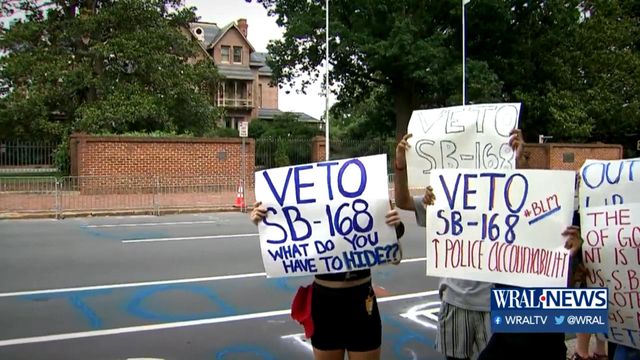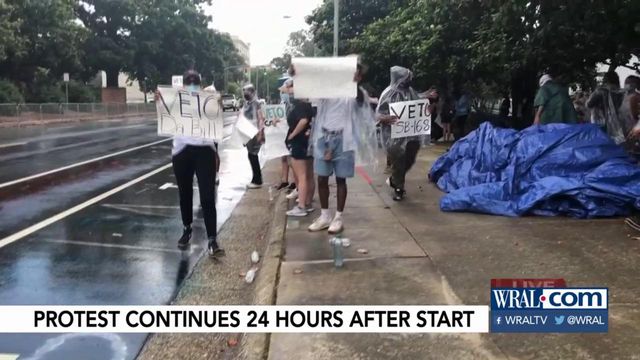Four arrested in protest over legislation keeping details of death investigations secret
Police on Tuesday arrested four protesters from among a large group gathered outside the governor's mansion in Raleigh.
Posted — UpdatedNjeri Dianne Kimata, 18, of Raleigh, Josefina Tawni Gordon, 21, of Cary, Taari Felice Coleman, 27, of Raleigh, and Trinity Alexis Hill, 19, of Youngsville, were each charged with injury to real property after the group's demands were spray painted on Blount Street.
Dozens of protesters spent the night on the sidewalk outside the Executive Mansion to demand that Gov. Roy Cooper veto a bill they say would set back the Black Lives Matter movement. Protesters were still on the scene into late Tuesday night and early Wednesday.
The protesters said the bill could keep secret details of deaths in police custody or jails, which they said conflicts with the changes in policing that they have been fighting for since George Floyd's death in police custody in Minneapolis last month launched protests across the country.
Even rapper Ice Cube tweeted his position against the bill, saying "Governor Cooper do not sign this into law. Don't give more cover for Killer Cops."
WRAL News has asked the Governor's Office for a statement but has not heard back.
"It’s just a terrible move in the wrong direction, away from police accountability. We want more transparency, more accountability," protester Todd Morman said.
The measure has been under consideration at the legislature for more than a year, and no one flagged it.
House Majority Leader John Bell said Tuesday that DHHS and its chief medical officer requested the confidentiality language be put into the bill.
"The General Assembly acted in good faith to fulfill their request, and that’s why it was included in the bill," Bell, R-Wayne, said in a statement. "After further conversations and discussions about its unintended consequences, I am confident this will be revisited and corrected once the legislature reconvenes."
Lawmakers are expected back in Raleigh briefly next week and again in early September.
"In light of current events, there is heightened awareness of public records and death investigations – and rightfully so," Rep. David Lewis, R-Harnett, chairman of the powerful House Rules committee, said in a statement. "I’ve carefully investigated this issue and found that the provision does not place any new restrictions on public records, and I commit to fixing the provision if the governor vetoes the bill."
"If it’s very clear that this bill needs to be revisited, veto it and let the General Assembly write it again. That’s the point," said Coleman, one of the protest organizers.
Coleman said the group arrived at the Executive Mansion at 9 p.m. Monday with tents. She said police officers told the protesters they could not pitch the tents, which block the sidewalk, but that they could use chairs.
The group of about 12 set up folding chairs and sleeping bags and slept downtown.
"A couple people stayed overnight because they are so enraged about this bill," she said.
The group said police officers woke them up around 4:30 a.m. and informed them could not sleep on the sidewalk. Then, at 9:15 a.m., officers approached the group again, telling them they could keep protesting but they had to stand up, not sit.
The protesters stayed seated, and the police officers walked back to their patrol cars after standing with protesters for several minutes.
By 9:30 a.m., protesters began chanting, "Roy Cooper, do you hear us? Roy Cooper, do you see us? Show your face. Show us you're listening. That's all we ask."
One protester said, "I have a job ... but you're making me sit out here."
Police began massing near the protesters shortly after noon. They plucked the four women from the crowd at about 1:30 p.m., and many of the remaining protesters slowly drifted away after that.
A small group remained, however, and police kept close watch on them into the evening.
"Really, all we can do is protest, and they don’t pay attention when we protest nicely," Morman said. "That Confederate monument [outside the State Capitol] did not come down because we protested nicely."
• Credits
Copyright 2024 by Capitol Broadcasting Company. All rights reserved. This material may not be published, broadcast, rewritten or redistributed.






